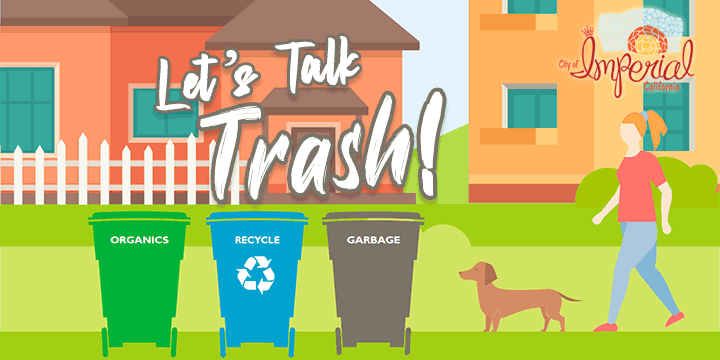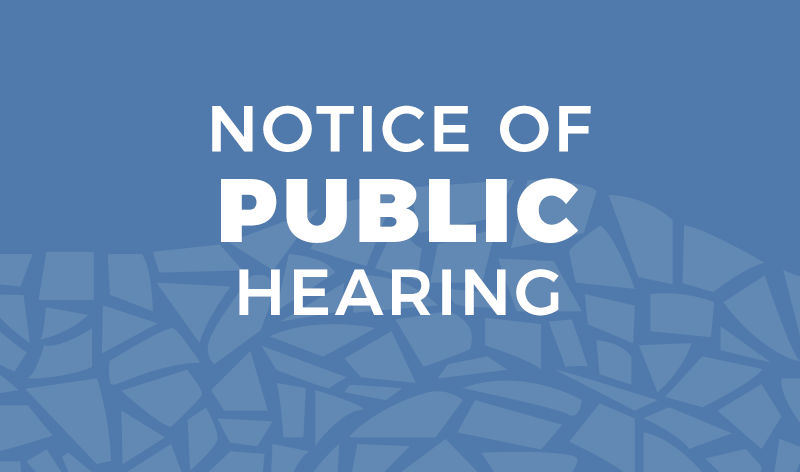Guide to California SB1383
SB 1383 is the most aggressive waste reduction law to be adopted in California for the past 30 years. The law will affect almost everyone, and unlike previous laws, jurisdictions may issue penalties for non-compliance. A summary of requirements is provided in this guide, and free educational resources and assistance are available to help you achieve compliance.



California is experiencing a climate crisis: record-breaking temperatures, longer fire seasons, extreme droughts, and rising sea levels. These extreme weather events are partly caused by too much greenhouse gas in the atmosphere, so named because they trap the sun’s heat and warm the planet.
When organic materials such as food and yard debris end up in the landfill, they decompose anaerobically (without oxygen) and produce greenhouse gases. Composting organic materials significantly reduces greenhouse gas production. Furthermore, when finished compost is applied on land, greenhouse gases are pulled from the atmosphere and into the soil. By composting organic materials and recovering edible food for hungry people, we can all do our part to slow climate change.
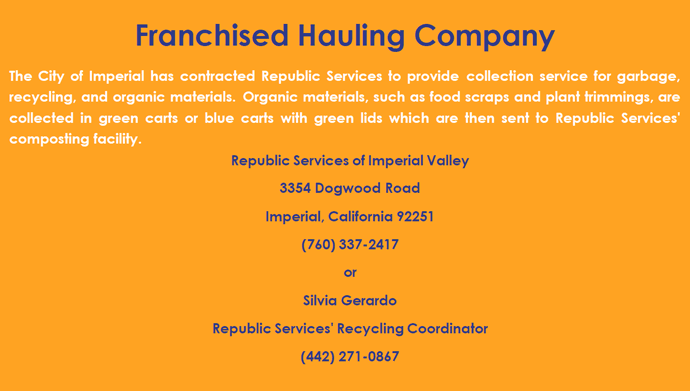

The SB 1383 regulations apply to all persons and entities that generate organic materials, such as food scraps and plant trimmings. Everyone is required to divert their organic materials from the garbage. In addition, certain entities that provide food will be required to donate their excess food to feed people.
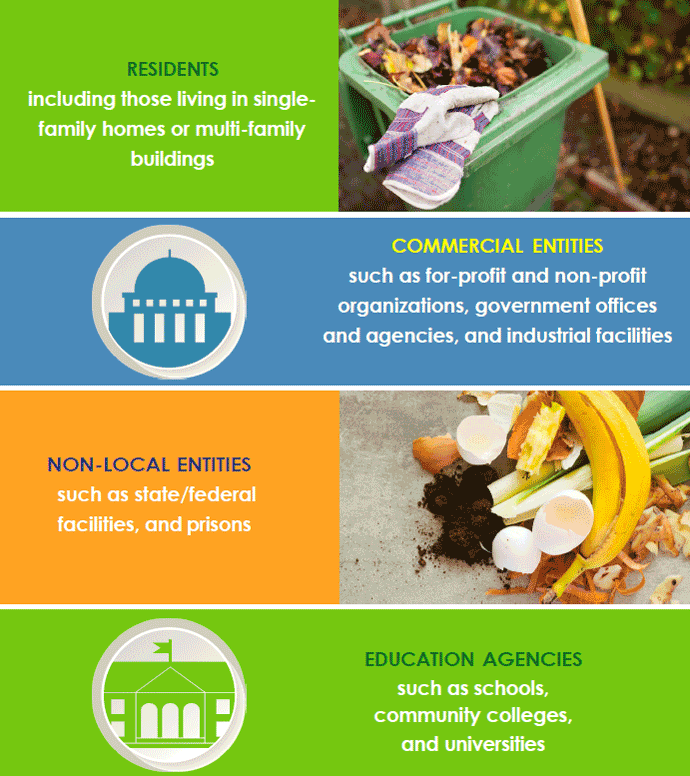
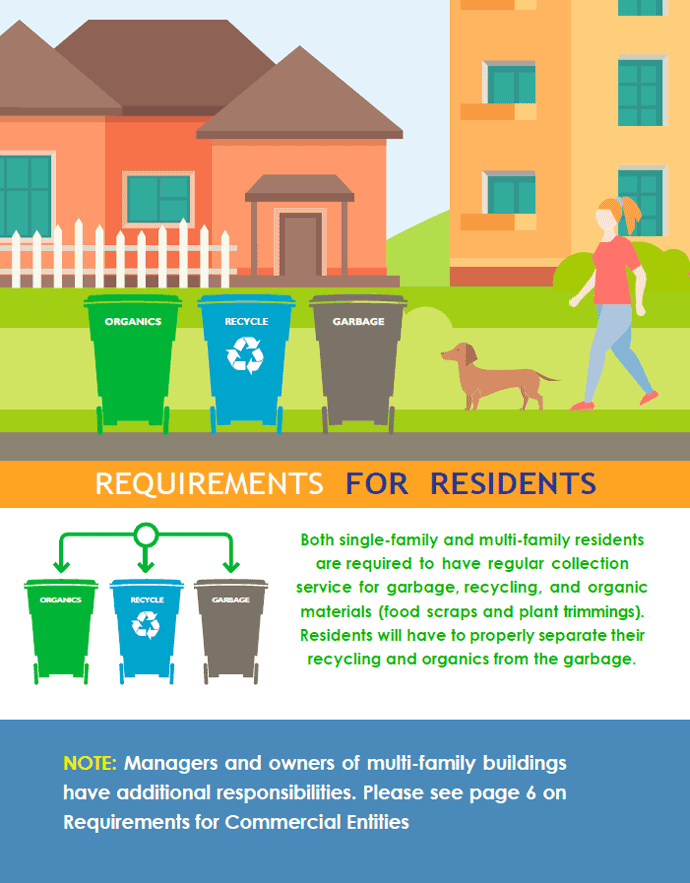

Examples of non-local entities are, state agencies, and federal facilities. Examples of education agencies include universities, school districts, charter schools, and community colleges.
- Subscribe to organics collection service in addition to garbage and recycling through a franchised hauling company. Alternatively, self-haul is permissible as long as organics and recyclables are not landfilled, and records of receipts and weight tickets are kept for 5 years.
- Provide recycling and organics collection containers in all areas where a garbage container is located, except for restrooms. The collection containers must conform to the color scheme: green for organics, blue for recycling, gray for garbage. *
- Prohibit employees from placing organics in the garbage.
- Periodically inspect the recycling and organics containers for contamination and if any is found, provide information/education to correct behavior.
- Provide education to employees on how to prevent generation of organic materials (source reduction).


These requirements apply to for-profit and non-profit businesses, including multi-family
residential properties, government offices, and industrial facilities.
- Subscribe to organics collection service in addition to garbage and recycling with Republic Services. Alternatively, self-haul is permissible as long as organics and recyclables are not landfilled and records of receipts and weight tickets are kept for 5 years.
- Provide organics and recycling containers to employees, contractors, tenants, and customers.
There must be access to an adequate number, size, and location of containers. Containers for organics and recycling must be provided in all areas where garbage containers are present, except for restrooms or inside multi-family dwelling units.
Container bodies or lids shall conform to the following color scheme: gray for garbage, blue for recycling, and green for organics.
- Annually provide educational information to tenants and staff about the requirements to separate organics and recycling from the garbage. In addition, education must be provided on how to properly sort the three waste streams into correct containers. Please note, for new tenants, this information must be provided before or within 14 days of move-in.
- Periodically inspect recycling and organics containers and inform employees if contamination is found.

Commercial entities, non-local entities, and education agencies may be exempted from some or all of the requirements if they can provide documentation or evidence to support one of the following reasons. Please note that “solid waste” is defined as the entire waste stream, including garbage, recycling, and organics.
- De Minimis: minimal organic material is generated.
If an entity produces more than 2 cubic yards of total solid waste per week, minimal organic material means less than 20 gallons.
If an entity produces less than 2 cubic yards of total waste per week, minimal organic material means less than 10 gallons.
- Physical Space Constraints: the premises lack adequate space to fit all three containers (garbage, recycling, and organics).
WE’RE HERE TO HELP
Yvonne Cordero, Planner, at (760)355-1152 or
email questions to ycordero@cityofimperial.org
Silvia Gerardo, Recycling Coordinator, at (442) 271-0867 or
email questions to sgerardo@republicservices.com
ADDITIONAL RESOURCES
For more recycling information, please visit CalRecycle’s website
What Can I Recycle? - I Recycle Smart

